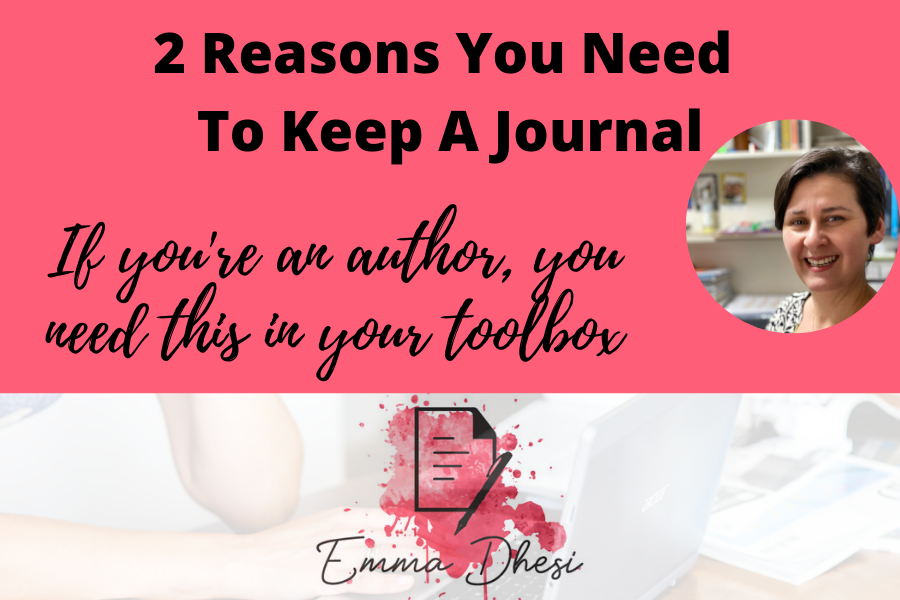If you are an author, you need to keep a journal. There are no two ways about it. It’s one of the most important implements an author can have in their toolbox.
It’s not a diary
A journal is not a diary. It’s not for writing what you did that day, the appointments you kept and who you spoke to. That’s what Google calendar is for!
A journal goes much deeper and is used to record your more meaningful interactions and experiences, as well as your daily affirmations and gratitudes if you write those.
There are two reasons you should keep a journal.
1. It gets you into the habit of writing every day
If you’re brand-new to writing and haven’t yet found your groove, journalling for five minutes or so at the beginning or end of the day is an ideal way to set up your writing habits.
It may be you don’t yet have a work in progress to write about, but you can journal about any ideas you’re mulling over or even what’s on your mind more generally.
Again, this isn’t about which appointment you had, it is about how you felt that day. Did you have an argument with someone in the supermarket over the last packet of toilet roll and it left you feeling out of sorts? Did your teenager say something particularly hurtful?
That is why you keep a journal, so you can write about it and let go of those negative feelings.
If someone paid you a compliment or said you did a good job on something, write about that too. Enjoy the feeling, you deserve to.
2. It helps you work out your story and how you feel about your writing
This is a place where you can write out what is and isn’t working with your work in progress. It’s where you can jot down ideas about storyline or character.
Or generally, just have a good moan about what’s not working!
If you’ve hit a dead-end in your story, solutions will miraculously open up in front of you. They will appear in ways you would never have envisaged if you’d simply sat at your desk and stared at a blank page or screen.
Equally, you can celebrate what is working in your novel. You can write about what you do you like about your characters, their funny quirks and what makes you laugh.
I never cease to be amazed at how much clarity I gain from journalling about my work in progress. For example, I have an idea for my next novel but at the moment that’s all it is.
I’m a discovery writer so I never know what will happen, but I like to jot down notes and ideas to help formulate a basic story in my head.
Let your subconscious take over
Journalling is a bit like freewriting, it lets your subconscious take over. And when that happens, you just don’t know what will emerge.
I journal each night. Most evenings I only write my affirmations and gratitudes. But when there is something bothering me, work-related or otherwise, I take the time to go to bed early and write it out.
Nine times out of ten I will find a solution or way through whatever is bothering me. It might not be the ultimate answer, but it is the next step along the road to moving beyond the predicament I’m in.
What you write about might be work-related, it might be about your relationship, it might even be parenthood related. No matter what, journalling will help you sort out what’s important and what isn’t, what you can do something about and what you have no control over.
Journal examples
If you’re looking for something to kick-start your journalling life, one of these should get you going:
- Bullet journal – literally list out the things that have impacted your day
- Morning pages – you write as soon as you wake up in the morning before you’ve had a chance to switch on properly. The idea behind this is that you’ll write from a free place before you’ve allowed your rational brain to dictate your thoughts. Julia Cameron’s book, The Artist’s Way, goes into morning pages in a lot of detail and is an exceptional book for all creatives.
- Gratitudinal journal – this is what I do each day. You simply write down 10 things you’re grateful for that day. It can be big stuff like a new job or house, to tiny things like a particularly good cup of coffee or seeing a bird singing in the tree outside your home.
I add my affirmations onto this as well, thus completing the circle of gratitude for things that have happened and those that have yet to come.
- Health journal – if you’re going through a particularly tough health problem, write about it. It will be something for you to look back on and chart your road to wellness. If you’re getting fitter, record how you’re feeling after each exercise session or a new recipe you’ve tried. Record your weight or clothes size, or however you’re measuring your new fitness.
- Pregnancy journal – what better way to remember your pregnancy than with a journal. You can keep a record of your growing waistline, body changes, the first kicks, the fatigue and the joy! You can stick photos of your bump in there and list possible names. Pregnancy is such a weird and wonderful time of life (you’re growing a human for goodness sake!!) it’s well worth documenting.
A final tip
So many people write electronically these days, but my little tip to you would be to invest in a nice notepad and pen. There is something very grounding about doing it this way because it slows your brain down and connects you in a much more visceral way to the words you’re writing.
Plus, it’s only for you so you don’t need to worry about your handwriting!
Additionally, there’s something aesthetically pleasing about a nice notebook. It is much more personal and will mean a lot more than a plain old google document.
If you found this useful, you’ll love these:





Thank you!! I am still trying very hard at this time to set up a schedule.
Hi NetaQ, you’re welcome! I hope journalling will help you work out when you can put time aside for your writing. You can even use your journal as a place to vent how frustrated you are not being able to find a schedule that works!
I also find it very helpful on a personal level – clearing my head of things that are bothering me or similar. Once I’ve journalled them I feel like I can move on to other writing without it influencing the writing.
I’m always amazed at how powerful journalling is. If I’ve had a run-in with someone or woken up in a grouchy mood and can’t shake it off, 10 minutes of putting it all down on paper really clears the cobwebs!